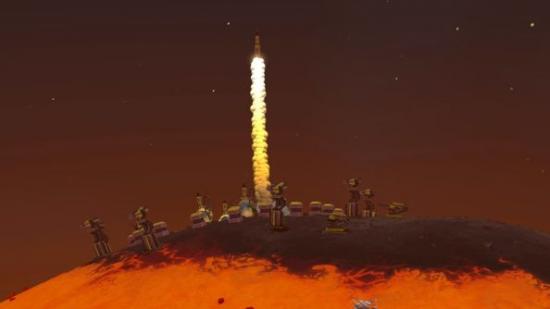Planetary Annihilation developers Uber Entertainment had to dodge violently raised eyebrows when they launched the game on Steam Early Access for $90 – a price they justified in reference to its Kickstarter backers, who’d paid the same amount just months before.
Uber Entertainment’s Bob Barry reckons the slightly silly price tag helped the company do more than retain the trust of their backers, though – while some “screamed and yelled and called us thieves”, he believes the price gave the in-progress game the manageable trickle of new players it needed – rather than a flood.
“It was actually a natural gate into the community,” Barry told a Steam Early Access panel audience at Steam Dev Days. “We really didn’t want to get inundated with tons and tons of users. We were not ready to handle that. So for us it was a nice, natural barrier to keeping our population under control and not having it grow beyond what we can handle right now.”
Barry pointed out that Uber run all of Planetary Annihilation’s servers themselves – an expensive operation, especially as the game isn’t yet optimised.
“Keeping that number artificially low is a good thing right now,” he said.
His comments were backed up by Introversion’s Mark Morris. Prison Architect launched on Steam Early Access in alpha – but drew minor criticism from some early adopters when it was later sold at a discount.
“With any Early Access title, I think it’s important to think about how many customers see the game at what part of the process,” said Morris.
“Our view on that is that it’s a gateway to control the number of players you’ve got. You need people to understand that you’re in alpha, you need people to understand that the game might be buggy, you need them to be able to see through some minor interface issues and give you some really strong feedback.
Morris suggested that strong feedback was impossible to get from “huge swathes of players” due to sheer volume. By selling the game at an initial high price and dropping it gradually, developers are instead able to control the flow of players: “which is very important because it allows you to control your relationship with them”.
“I think ultimately you will be able to get Prison Architect in a Humble Bundle – but that’ll be in three or four years’ time,” Morris said. “But if you want to play it now, you’re going to pay more. It’s like you have to pay more to see a film in the cinema, but eventually it’ll be on TV and you’ll see it for free.”
What players are paying for, then, is a chance to be among the first people to play a game – something Morris thinks is “a legitimate thing to charge for”.
Such talk is at odds with the Minecraft Approach, more recently adopted by bigger games like Arma III, in which early players are rewarded for taking a chance on a potentially buggy game with a lower price point. Developers can then bump the price up as their game approaches release.
That’s what Klei Entertainment did with Don’t Starve. They released the game on Early Access as a low-price two-for-one bundle – as a “Thank you for playing my shitty unfinished game that’s really kind of broken”.
Looking back, studio co-founder Jamie Cheng doesn’t believe that a higher price would have made Don’t Starve more successful.
“I think Don’t Starve was a success because people were playing it, they were happy about their price, they were talking about the game a lot,” he told the panel audience.
“They said, ‘It’s cheap, you should try it’. And then there was this huge wave of people who were playing our game and continually talking about it. From our perspective, I saw people talking about it who said, ‘Yeah, it’s buggy, but it’s two-for-one’.
“It’s kind of complicated, that’s how I feel.”
How do you lot feel? It’s hard to tailor a price-coat to fit everyone, given the huge variety of states in which games arrive on Early Access. But have you been happy with the value of the Early Access games you’ve bought into so far? And what about Rust, swamped by players before it was 10% finished? Should Facepunch have charged more?
